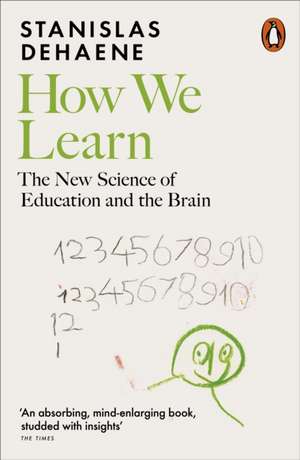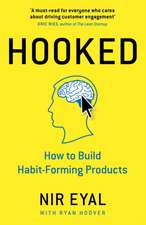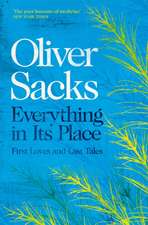How We Learn: The New Science of Education and the Brain
Autor Stanislas Dehaeneen Limba Engleză Paperback – 27 ian 2021
Humanity's greatest feat is our incredible ability to learn. Even in their first year, infants acquire language, visual and social knowledge at a rate that surpasses the best supercomputers. But how, exactly, do our brains learn?
InHow We Learn, leading neuroscientist Stanislas Dehaene delves into the psychological, neuronal, synaptic and molecular mechanisms of learning. Drawing on case studies of children who learned despite huge difficulty and trauma, he explains why youth is such a sensitive period, during which brain plasticity is maximal, but also assures us that our abilities continue into adulthood. We can all enhance our learning and memory at any age and 'learn to learn' by taking maximal advantage of the four pillars of the brain's learning algorithm: attention, active engagement, error feedback and consolidation.
The human brain is an extraordinary machine. Its ability to process information and adapt to circumstances by reprogramming itself is unparalleled, and it remains the best source of inspiration for recent developments in artificial intelligence. How We Learn finds the boundary of computer science, neurobiology, cognitive psychology and education to explain how learning really works and how to make the best use of the brain's learning algorithms - and even improve them - in our schools and universities as well as in everyday life.
| Toate formatele și edițiile | Preț | Express |
|---|---|---|
| Paperback (2) | 59.41 lei 21-33 zile | +22.56 lei 6-12 zile |
| Penguin Books – 27 ian 2021 | 59.41 lei 21-33 zile | +22.56 lei 6-12 zile |
| Penguin Random House SEA – feb 2021 | 100.83 lei 3-5 săpt. |
Preț: 59.41 lei
Preț vechi: 70.32 lei
-16% Nou
11.37€ • 11.87$ • 9.41£
Carte disponibilă
Livrare economică 14-26 martie
Livrare express 27 februarie-05 martie pentru 32.55 lei
Specificații
ISBN-10: 0141989300
Pagini: 352
Dimensiuni: 129 x 198 x 20 mm
Greutate: 0.28 kg
Editura: Penguin Books
Colecția Penguin
Locul publicării:London, United Kingdom
Notă biografică
Stanislas Dehaene is one of Europe's leading neuroscientists, and has been studying how education changes our brains for over thirty years. He is professor of Experimental Cognitive Psychology at the Collège de France, and director of the NeuroSpin brain imaging in Saclay. He is a member of seven academies and has received several international prizes, including the highest award in neuroscience, the Brain Prize. Dehaene's previous books, which have been translated into fifteen languages, include Consciousness and the Brain, Reading in the Brain and The Number Sense.
Recenzii
An entertaining survey of how science from brain scans to psychological tests is helping inspire pedagogy. Dehaene challenges many tropes [and] describes much of his own pioneering work ... Well translated from the French with some touching references to his upbringing, from the cult filmLa Jetéeto the writing of Daniel Pennac.
Descriere
'Absorbing, mind-enlarging, studded with insights ... This could have significant real-world results' Sunday Times
Humanity's greatest feat is our incredible ability to learn. Even in their first year, infants acquire language, visual and social knowledge at a rate that surpasses the best supercomputers. But how, exactly, do our brains learn?
In How We Learn, leading neuroscientist Stanislas Dehaene delves into the psychological, neuronal, synaptic and molecular mechanisms of learning. Drawing on case studies of children who learned despite huge difficulty and trauma, he explains why youth is such a sensitive period, during which brain plasticity is maximal, but also assures us that our abilities continue into adulthood. We can all enhance our learning and memory at any age and 'learn to learn' by taking maximal advantage of the four pillars of the brain's learning algorithm: attention, active engagement, error feedback and consolidation.
The human brain is an extraordinary machine. Its ability to process information and adapt to circumstances by reprogramming itself is unparalleled, and it remains the best source of inspiration for recent developments in artificial intelligence. How We Learn finds the boundary of computer science, neurobiology, cognitive psychology and education to explain how learning really works and how to make the best use of the brain's learning algorithms - and even improve them - in our schools and universities as well as in everyday life.























